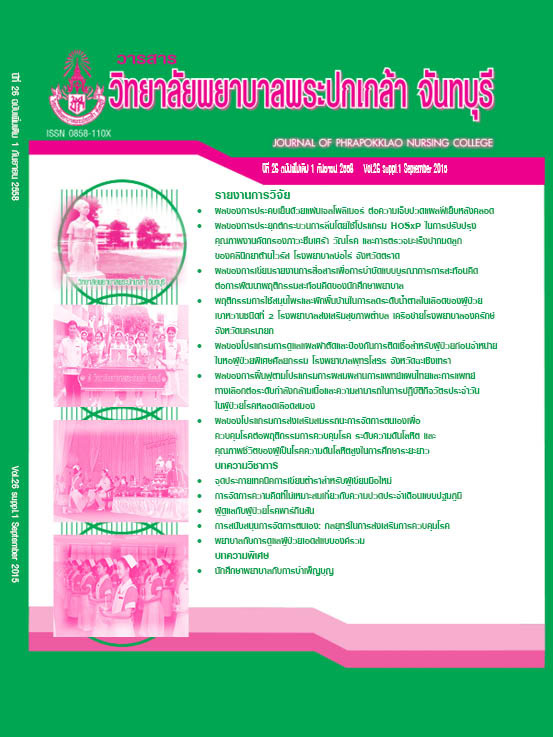Self-management Support: Strategies for Promoting Disease Control
Keywords:
-Abstract
-
References
จันทร์เพ็ญ หวานคำ. (2555). ผลของโปรแกรมการจัดการตนเองต่อพฤติกรรมการควบคุมโรคความดันโลหิตสูง และค่าเฉลี่ยความดันหลอดเลือดแดงของผู้ที่เป็นโรคความดันโลหิตสูง (วิทยานิพนธ์ปริญญามหาบัณฑิต). ปทุมธานี: มหาวิทยาลัยธรรมศาสตร์.
ชดช้อย วัฒนะ, สุธน พรธิสาร, ณฐวรรณ รักวงศ์ประยูร, และปริญญา แร่ทอง. (2552). ผลของโปรแกรมการส่งเสริมสมรรถนะในการจัดการตนเองเกี่ยวกับโรคเบาหวานต่อความรู้ การรับรู้สมรรถนะในการจัดการตนเอง การควบคุมระดับน้ำตาลในเลือด ค่าดัชนีมวลกาย และคุณภาพชีวิตของผู้ป่วยเบาหวานชนิดที่ 2 (วิทยานิพนธ์ปริญญามหาบัณฑิต). ปทุมธานี: มหาวิทยาลัยธรรมศาสตร์.
ปราณี สายรัตน์. (2555). ผลของโปรแกรมการฝึกการจัดการตนเองต่อความสามารถในการทำหน้าที่ของร่างกาย การเกิดอาการกำเริบเฉียบพลัน และคุณภาพชีวิตของผู้ป่วยโรคปอดอุดกั้นเรื้อรัง (วิทยานิพนธ์ปริญญามหาบัณฑิต). ปทุมธานี: มหาวิทยาลัยธรรมศาสตร์.
ลดาวัลย์ ฤทธิ์กล้า. (2554). ผลของโปรแกรมการส่งเสริมการจัดการตนเองต่อพฤติกรรมการจัดการตนเอง ภาวะหายใจลำบาก ความสามารถในการทำกิจวัตรประจำวัน และคุณภาพชีวิตของผู้ป่วยภาวะหัวใจล้มเหลว (วิทยานิพนธ์ปริญญามหาบัณฑิต). ปทุมธานี: มหาวิทยาลัยธรรมศาสตร์.
ลดาวัลย์ ฤทธิ์กล้า, ชดช้อย วัฒนะ, และพีระพงษ์ กิตติภาวงศ์. (2555). ผลของโปรแกรมการส่งเสริมการจัดการตนเองต่อพฤติกรรมการจัดการตนเอง ภาวะหายใจลำบาก ความสามารถในการทำกิจวัตรประจำวัน และคุณภาพชีวิตของผู้ป่วยภาวะหัวใจล้มเหลว. พยาบาลสาร, 39(1), 64-76.
ศันสนีย์ กองสกุล. (2552). ผลของโปรแกรมการฝึกทักษะการจัดการตนเองต่อพฤติกรรมการจัดการตนเองในการควบคุมโรคเบาหวานและระดับน้ำตาลในเลือดของผู้ที่เป็นเบาหวานชนิดที่ 2 (วิทยานิพนธ์ปริญญามหาบัณฑิต). ปทุมธานี: มหาวิทยาลัยธรรมศาสตร์.
สมาคมโรคเบาหวานแห่งประเทศไทย สมาคมต่อมไร้ท่อแห่งประเทศไทย, และสำนักงานหลักประกันสุขภาพแห่งชาติ. (2551). แนวทางเวชปฏิบัติสำหรับโรคเบาหวาน พ.ศ. 2551. สืบค้น วันที่ 12 กุมภาพันธ์ 2554, จาก http://www.diabassocthai.org/v1/file_attach/31Oct200817-AttachFile1225433537.pdf
อรวรรณ ประภาศิลป์, ชดช้อย วัฒนะ, และทิพาพร ธีระวานิช. (2556). ผลของโปรแกรมการส่งเสริมสมรรถนะในการจัดการตนเองต่อพฤติกรรมการจัดการตนเอง ภาวะอ้วน ความเสี่ยงต่อการเกิดโรคหัวใจและหลอดเลือด และการหายจากภาวะเมตาบอลิกซินโดรมในผู้ที่มีภาวะเมตาบอลิกซินโดรม. พยาบาลสาร, 40(1), 34-48.
Bandura, A. (1997). Self-efficacy: The exercise of control. New York: Freeman and Company.
Barlow, J., Wright, C., Sheasby, J., Turner, A., & Hainsworth, J. (2002). Self-management approaches for people with chronic conditions: A review. Patient Education and Counseling, 48(2), 177-187.
Browder, D. M., & Shapiro, E. S. (1985). Applications of self-management to individuals with severe handicaps: A review. Journal for the Association for Persons with Severe Handicaps, 10(4), 200-208.
Creer, L. T. (2000). Self-management of chronic illness. In Boekaerts, M., Printrich, P. R., & Zeidner, M. (Eds.). Handbook of self-regulation. pp. 601-629. San Diego, CA: Academic Press.
Creer, T. L., & Holroyd, K. A. (1997). Self-management. In Baum, A., McManus, C., Newman, S., Weinman, J., & West, R. (Eds.). Cambridge handbook of psychology, health, and behavior. pp. 255-258. Cambridge: Cambridge University Press.
Gruman, J., & Von Korff, M. (1996). Employee self-management of health: Techniques that improve outcomes and cut costs. Retrieved August 15, 2002, from http://www.cfah.org/publications/self-management.cfm
Lorig, K., & Holman, H. (1993). Arthritis self-management studies: A twelve-year review. Health Education Quarterly, 20(1), 17-28.
Milenkovi, T., Gavrilovic, S., Percan, V., & Petrovski, G. (2004). Influence of diabetic education on patient well-being and metabolic control. Diabetologia Croatica, 33(3), 91-96.
Riegel, B., Carlson, B., & Glaser, D. (2000). Development and testing of a clinical tool measuring self-management of heart failure. Heart and Lung, 29(1), 4-15.
Schreurs, K. M. G., Colland, V. T., Kuijer, R. G., de Ridder, D. T. D., & van Elderen, T. R. (2003). Development, content, and process evaluation of a short self-management intervention in patients with chronic diseases requiring self-care behaviors. Patient Education and Counseling, 51(2), 133-141.
Wagner, E. H, et al. (2001). Quality improvement in chronic illness care: A collaborative approach. Joint Commission Journal on Quality Improvement, 27(2), 63-80.
Wattana, C., Srisuphan, W., Pothiban, & Upchurch, S. (2007). Effects of a diabetes self-management program on glycemic control, coronary heart disease risk, and quality of life among Thai patients with type 2 diabetes. Nursing and Health Science, 9(2), 135-141.
Downloads
Published
How to Cite
Issue
Section
License
Copyright (c) 2015 Journal of Phrapokklao Nursing College

This work is licensed under a Creative Commons Attribution-NonCommercial-NoDerivatives 4.0 International License.
เนื้อความ ข้อมูล และรายการอ้างอิงที่ผู้เขียนใช้ในการเขียนบทความเพื่อลงตีพิมพ์ในวารสารวิทยาลัยพยาบาลพระปกเกล้า จันทบุรี ถือเป็นความคิดเห็นและความรับผิดชอบของผู้เขียน คณะผู้จัดทำวารสารไม่จำเป็นต้องเห็นพ้องด้วยหรือร่วมรับผิดชอบ
บทความที่ได้รับการลงตีพิมพ์ในวารสารวิทยาลัยพยาบาลพระปกเกล้า จันทบุรี ถือเป็นลิขสิทธิ์ของวารสารวิทยาลัยพยาบาลพระปกเกล้า จันทบุรี หากหน่วยงานหรือบุคคลใดต้องการนำส่วนหนึ่งหรือทั้งหมดของบทความไปเผยแพร่ต่อเพื่อวัตถุประสงค์ใด ๆ จะต้องได้รับอนุญาตจากบรรณาธิการวารสารก่อน



